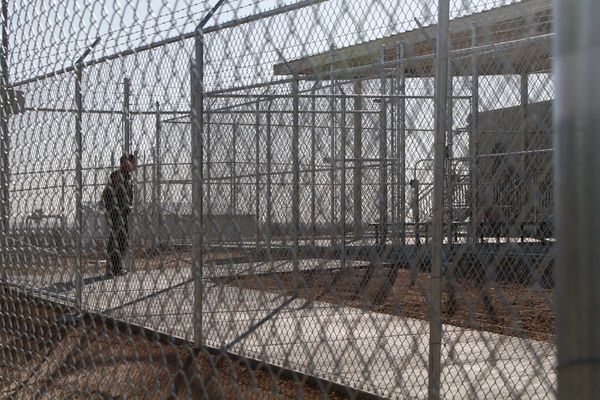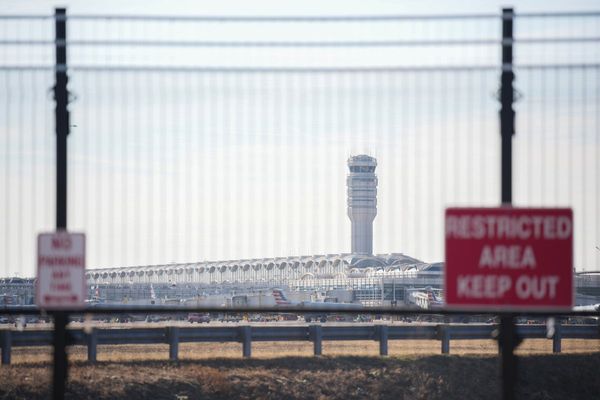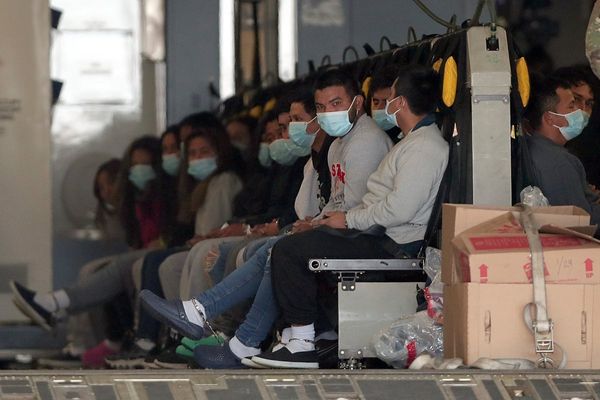The U.S. stock market suffered its biggest single-day drop since the 1987 crash Monday as the coronavirus pandemic severely disrupted American life and forced investors to confront fears that a recession may already be underway.
All three major stock indexes plummeted 12% or more, with the Dow Jones industrial average losing nearly 3,000 points and the Nasdaq composite diving 12.3% _ a record for the index.
The Dow has tumbled 32% since reaching its record high just four weeks ago.
A key reason: Investors realize that consumer spending, which accounts for roughly 70% of U.S. economic growth, is expected to fall abruptly as the coronavirus outbreak prompts job cuts, cancels events, shuts gathering places and pushes people into their homes.
The sudden slowdown already has put the U.S. economy in recession, University of California, Los Angeles Anderson School of Management economists said Monday, adding that they expect the pullback to last through September.
President Donald Trump said Monday that the virus outbreak could last until August or later, and that "it may be" that the nation already is in a recession. But, he said, "we're not thinking in terms of recession, we're thinking in terms of the virus."
"The best thing I can do for the stock market is _ we have to get through this crisis, that's what I can do, that's the best thing we can do," Trump said. The Dow has lost nearly the entire gains it enjoyed since he took office in 2017.
The virus's business impact is particularly acute in areas such as Los Angeles, where bars and nightclubs have been ordered to close and restaurants can't host diners until at least March 31 in order to curb the virus' spread.
Other cities and states have taken similar actions, and that's on top of an ever-expanding list of closed retailers, travel-service cutbacks and canceled sporting events, concerts, casino gaming and myriad other activities where people spend money.
Monday's nosedive came despite the Federal Reserve's emergency cut in its benchmark interest rate to near zero and other actions Sunday intended to stabilize the markets and keep credit available to businesses.
Stock investors were unmoved, and a cascade of sell orders Monday triggered a 15-minute trading halt moments after the opening bell, the third time such a halt was needed in the last two weeks.
Prices stabilized for much of the session and then sank again in the final hour as Trump and other government officials fielded questions about the pandemic.
So, what is Wall Street telling us?
"Markets are forward looking, and stock prices reflect the expectations investors have of future corporate earnings and economic growth," said Greg McBride, chief financial analyst at Bankrate.com.
"The reason the stock market is down again is that there's still a lot we don't know about the virus and its economic impact" except that "now a recession is all but guaranteed," McBride said.
The Fed's moves, he said, were to "make sure markets continue to function properly" and ensure businesses have access to credit, because "if credit markets seize up, a health crisis quickly morphs into a financial crisis."
But the Fed's action can't stop a sudden slowdown in consumer spending because many stores are closed and people are suddenly out of work, analysts said.
"When you shut everything down, you go from 60 mph to zero in a hurry" in terms of spending, said Jim Paulsen, chief investment strategist at the Leuthold Group. "More importantly, you're going to shatter confidence."
Although many of the closed retailers and other businesses have said they'll keep paying their employees, about 4.4 million U.S. jobs in the leisure and hospitality industries _ including bars and restaurants _ are at risk, the outplacement firm Challenger, Gray & Christmas Inc. said Monday.
J. Keith Buchanan, a portfolio manager at Globalt Investments, said that as investors keep hearing of additional store closures and other cuts that could jeopardize employment, "they realize the situation becomes darker every day."
"What worries the market is the prospect of that (economic slowdown) becoming more widespread," Buchanan said. With consumer spending "now in the crosshairs" of the pandemic, the threat of lower corporate earnings and a recession increases, he said. "That's why the stock market is really taking it on the chin and giving back its gains of the last year in very short order."
Concurrent with the virus's spread has been a plunge in oil prices, spurred both by an expected drop in consumer demand and by a price war between Saudi Arabia and Russia. Crude oil on U.S. markets skidded an additional 9.5% on Monday to $28.70 a barrel.
That's why energy stocks have been among the hardest hit in the last two weeks. So have travel-related stocks, along with retail and financial stocks. Many have seen half of their value, or more, wiped out so far this year.
Bank stocks have been hammered because "when people are out of work they fall behind on their loan payments," McBride said. "We will see unemployment rise, we will see loan delinquencies rise and we will see loan defaults rise."
The mood among many stock investors has been that "I'll sell first and reassess later," said Sam Stovall, chief investment strategist at CFRA Research.
Even the stock of Amazon.com, which has seen a surge of online orders in recent days amid the virus-induced turmoil, has tumbled 14% in the last two weeks.
"Investors invest because they want a cut of the action" of growing corporate profits and a growing economy, "and consumer spending represents 70% of that economy," Stovall said. "So, 70% of your earnings potential is affected by the virus, but the problem is you don't know by how much."
Indeed, although the stock market can be a leading indicator of some trends, there are many things it cannot foresee.
The market "can't tell you just how pervasive this virus will become, and it can't tell you how effective the responses will be from the government, whether it's fiscal or monetary policy," Buchanan said.
Paulsen said the market's inability to get a grasp on the extent of the virus' effect is evident in the "massive volatility going on," with the Dow moving 9% or more up and down in the last three sessions.
"There's a lot the market doesn't know," he said. "The market's not perfect on telling you what corporate earnings are going to do, or what interest rates are going to do, let alone what's going to happen with a pandemic."
Even those who specialize in making predictions are not infallible. For example, on Monday, economists at the UCLA Anderson School of Management _ the university's graduate business school _ revised a forecast issued just last week, which had stopped short of predicting a recession. The revised version says the U.S. economy has already stopped growing and will remain in recession through the end of September.
It was the first time in the 68-year history of the forecast that it has been revised before its planned quarterly update.
The economists said they revised the forecast after incorporating a review of how the 1957-58 H2N2 influenza pandemic affected the U.S. economy.
The year started solidly, but the forecast predicted that the virus' rapid effects would slow economic growth in the current quarter to a rate of 0.4% and that the economy would shrink at a 6.5% rate in the second quarter and a 1.9% rate in the third quarter.
Assuming the pandemic ends this summer and supply chains are restored, the forecast predicts the resumption of normal economic activity and a growth rate of 4% in the fourth quarter.
Because California has a higher proportion of its economic activity linked to tourism and trans-Pacific transportation, the forecast predicts that the recession will be slightly more severe in the state.
California is expected to shed more than 280,000 of its payroll jobs, with leisure, hospitality and transportation sector jobs accounting for more than one-third of those. That would drive up the unemployment rate to 6.3% by the end of this year, with effects continuing into 2021, when unemployment is expected to average 6.6%.







